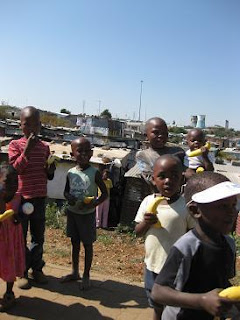Monday did finally end despite rumors to the contrary. At 11 (23 o'clock africa time) we went out to 021 Lounge - a jazz club that features locals in all different collections along with internaitonal gigs. As the international jazz fest is in South Africa this month, we went in knowing we might see some exceptionally talented people. The feature was "Funkist" from Japan. I can't believe it has only been a day, a big day in retrospect - I've been looking to see who is colored, black, white, African, Afrikaan, or other. I couldn't tell one group from another and the difference seems to be more about language and self-identity than outward appearances. In the confusion, we arrive at the smoky jazz club where race is significantly less important than it is in the rest of Cape Town life- and the group at center stage is a bunch of Japanese kids. I'm trying to think and watch life and wrap my mind around a bigger world and now Bunny adds Japanese jazz artists. Enough to say it was a good time aside from the smoke - and this entry is supposed to be about Tuesday...
Tuesday started with Robben Island. We caught the ferry from Cape Town across Table Bay to Robben Island. Robben Island was a leper colony and prison camps of various sorts prior to housing Nelson Mandela. The wind was whipping through the cape - so I don't have any idea how long it takes or what the on-ferry video touched on. Dramamine.


Our tour was hosted by a former MK member imprisoned in 1983. His talk was somewhat programmed. It was a bad place and working in a lime mine or dragging seaweed from the ocean and hacking it up to be barged to the mainland and dumped as fertilizer can't be fun when you are forced to do it for 12 hours a day.
Invited Guest (Pink): Just letting you know that Andrew has invited me to add my own perspective here on this stage of the trip. While I’m glad that we took the Robben Island tour, my personal feeling was that it was hard to get a sense of the conditions. If I hadn’t read read NM’s Long Walk to Freedom, I don’t think I would have gotten the true picture (discrimination in dress, food, privileges); what solitary confinement is like; what the hardships were for people who had to travel sometimes days to get to Robben Island at great expense to visit their loved ones for a half hour with a warder standing over them the whole time, interrupting their conversation to make sure they weren’t saying anything subversive or coded; what it was like to be a political prisoner, thrown in among the general hardened criminals. It’s hard to communicate these things as a tour guide with a language barrier, as you walk through an empty freshly painted testament to apartheid’s past. Definitely glad we read LWTF before we left.
We went to Robben Island with Bunny’s son Kevin, his wife, Betsy, their "surrogate" daughter Alexis (Kevin and Betsy were frequent babysitters for Alexis and have maintained strong ties though Alexis and her mom have made a new life in Sweden) and Bunny’s young friend Nolyanda (sp.) (who Betsy and Kevin are now friendly with) and her son Lanawbo (sp.). For me, one of the highlights of the trip was watching and listening to Lanawbo playing with the toy car Kevin and Betsy gave him in the corridor outside of Mandela’s cell. To me it signaled that life goes on and that there’s a human spirit that’s present and it’s this that can help overcome even the most repressive places and regimes.
On the ferry ride back, And and I stood outside on the starboard side. It was windy but sunny, and well worth it to watch Signal Hill, Lion’s Head, The Twelve Apostles, Devil’s Peak, and—of course—Table Mountain come into focus. Bittersweet because I know these beautiful mountains mocked the prisoners there and their captivity, but I know from the book that they also gave Mandela hope and strength.
We had lunch at a placed called Rooti’s on the waterfront while an African band played in the shadow of a red clock tower building. A little rest and sustenance helped us gear up for our ride out to Cape Point, but that’s a story for another blog post.
 It’s rare but some people start in poverty – but get more and more and more until at some point they may have living conditions, employment and even tolerable health care – just like other middle class people in the modern world. But it’s not enough. They want more.
It’s rare but some people start in poverty – but get more and more and more until at some point they may have living conditions, employment and even tolerable health care – just like other middle class people in the modern world. But it’s not enough. They want more.


















